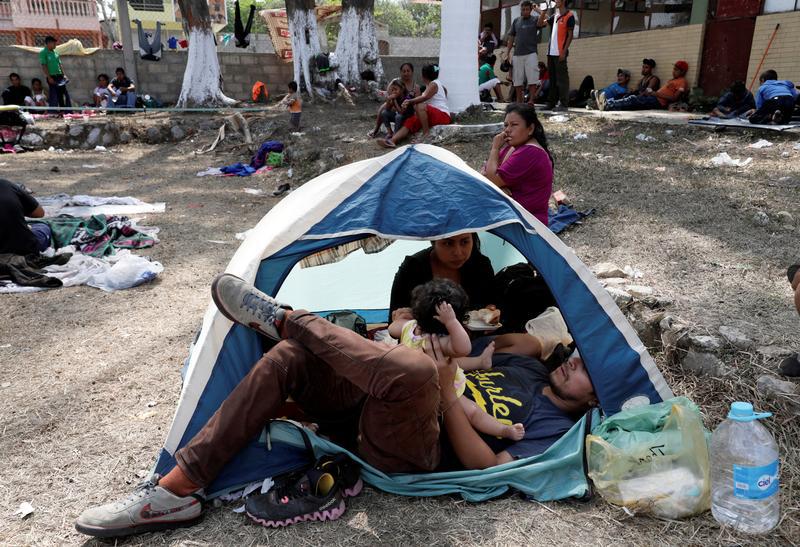Trump's Fearmongering about Migrant Caravan
| Publisher | Human Rights Watch |
| Publication Date | 4 April 2018 |
| Cite as | Human Rights Watch, Trump's Fearmongering about Migrant Caravan, 4 April 2018, available at: https://www.refworld.org/docid/5b39f27d0.html [accessed 5 June 2023] |
| Disclaimer | This is not a UNHCR publication. UNHCR is not responsible for, nor does it necessarily endorse, its content. Any views expressed are solely those of the author or publisher and do not necessarily reflect those of UNHCR, the United Nations or its Member States. |
US Congress Should Reject Draconian Asylum Policies
April 4, 2018 5:14PM EDT Dispatches
Clara Long, Senior Researcher, US Program
 Central American migrants take a break from traveling in their caravan, as they journey to the U.S., in Matias Romero, Oaxaca, Mexico April 3, 2018. © 2018 Reuters
Central American migrants take a break from traveling in their caravan, as they journey to the U.S., in Matias Romero, Oaxaca, Mexico April 3, 2018. © 2018 Reuters
President Donald Trump's three-day Twitter rant on migrants in Mexico and call to send National Guard troops to the border comes along with a new push from the White House for immigration legislation.
But the adminstration's legislative proposals are as draconian as Trump's tweets are misleading. And both draw from the same false narratives about asylum seekers and immigrants.
What Trump likes to call "catch and release" is the major focus of his ire. The Department of Homeland Security (DHS) uses this dehumanizing fishing metaphor to point to laws and court orders that have allowed unaccompanied children and families to avoid deportation and be released from detention pending a decision on their claims.
Under the administration's proposal, US law would be amended to allow DHS to send unaccompanied children back to situations of potential harm with only a cursory screening. It would also raise the bar for people seeking asylum in the US when they attempt to demonstrate "credible fear" of being returned, weakening a protection system that already fails too many vulnerable people.
Congress should say no.
Asylum seekers in the US already face formidable challenges to being protected, including lengthy court backlogs, lack of legal representation for people who cannot afford an attorney,prolonged detention, and widely inconsistent rates of granting asylum across the country, with some jurisdictions denying almost 90 percent of claims while others deny fewer than 25 percent.
Trump tries to justify his proposals by claiming "dangerous caravans" of migrants are heading through Mexico toward the US border.
But there is no indication that the caravan is anything other than a non-violent group of some 1,200 vulnerable people desperately seeking to escape violence in Central America or better their circumstances. The New York Times reports that many participants actually intend to stay in Mexico. In contrast to Trump's exaggerated alarm, the chief Border Patrol officer of the border's busiest area told Reuters that he didn't see the caravan disrupting their normal operations.
Trump is using the specter of a migrant invasion to justify his calls for harsh new asylum policies and for the military to guard the border, an idea that has already been tried to tragic effect. He is betting that his audience won't bother to check if there's any factual basis to the panic he is creating. But for the people impacted by his proposed policy changes – including vulnerable children fleeing for their lives – there are very real reasons to be afraid.
Link to original story on HRW website

